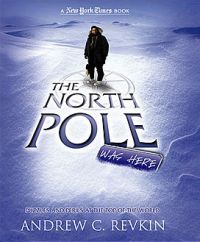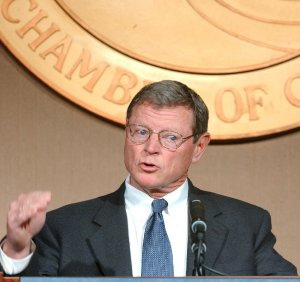 Andrew Revkin has been reporting on climate and science for The New York Times for over 10 years. He recently completed a book about his experiences in the Arctic: The North Pole Was Here, a straightforward but appealing you-are-here account of visiting the top of our home planet, where the air is thin, the “ground” is ice floating on the ocean, and everything is changing. The story is intended to be accessible to anyone over the age of ten. (The first chapter is available for free on the NYT site.)
Andrew Revkin has been reporting on climate and science for The New York Times for over 10 years. He recently completed a book about his experiences in the Arctic: The North Pole Was Here, a straightforward but appealing you-are-here account of visiting the top of our home planet, where the air is thin, the “ground” is ice floating on the ocean, and everything is changing. The story is intended to be accessible to anyone over the age of ten. (The first chapter is available for free on the NYT site.)
You might think it unlikely that a children’s book would warrant the attention or ire of a U.S. senator — but then, you may not know Marc Morano. Morano is a communications director for Senator James Inhofe (R-Oklahoma), a former staffer at The Rush Limbaugh Show, and the first in the media to publicize the smears of the Swift Boat veterans. Since joining Inhofe’s staff, Morano has issued communiques from the office of the Senate Environment Committee, which Inhofe chairs, blasting reporters that fail to give equal time to climate skeptics. (Read about Morano’s attacks on AP reporter Seth Borenstein and ex-NBC anchor Tom Brokaw.)
Neither the senator nor his attack dog appear to have read Revkin’s book, but it has drawn their fire nonetheless — not because of what it says, but because it was written by a reporter.
According to a story broken by Greenwire (paid subscription required) on Wednesday, Morano called into doubt the 20 years of Revkin’s reporting on climate change issues because “sales of Revkin’s book … would be enhanced by his paper’s coverage of climate.” Morano said: “We’re not just shooting arrows.”
I contacted Revkin to hear his point of view on the strange situation.
—–
Kit Stolz: How’s the book doing?
Andrew Revkin: It got a nice bounce when I was on Fresh Air (around a month ago), but it’s hard to break through to national media with something folks write off as a “kids book.” And Al Gore and his staff have done a stunningly great job of sucking all the carbon dioxide out of the talk-show circuit!
 KS: What did you think when you heard about the attacks from Senator Inhofe?
KS: What did you think when you heard about the attacks from Senator Inhofe?
AR: I realized he hadn’t read it when I saw the complaint about the alarmist title. The title refers to the fact that the North Pole ice camp was in motion. Scientists erected a sign reading “North Pole Is Here” but changed the “Is” to “Was” after a day because they’d drifted several miles over the 14,000-foot-deep ocean. It also refers to the unassailable fact that the arctic of our history and lore is being transformed by human actions.
KS: In the last few months, prominent far-right climate change denier and scientist William Gray compared Al Gore to Adolf Hitler. Yesterday in The Wall Street Journal, Peggy Noonan complained about the science of global warming and called for a conference of scientists to gather and decide if it is real — apparently not realizing that there have already been three such conferences. (Not to mention two reports from the National Academy of Sciences.) Now we have a proxy Senator claiming your book about going to the North Pole contaminates your reporting about climate change. Don’t these latest attacks seem a little ludicrous?
AR: When they say things like this, commentators like Peggy Noonan basically reflect the same lack of understanding of science (both how it works and what it has revealed) that an awful lot of Americans share. The Gallup data we cited in my April story critiquing climate alarmism (“Yelling Fire on a Hot Planet“) showed that in the last few years Americans have grown more concerned about the damage to the ozone layer than about human-caused global warming. The ozone hole filled up the one compartment in our brain available for atmosphere issues, it seems.
KS: Today, you report in the NYT that NASA removed the phrase “to understand and protect our home planet” from the NASA credo. You quoted an official describing this as a “from headquarters down” decision. You mention that James Hansen, who works for an institution affiliated with NASA, pointed to this phrase to defend his right to speak out last winter, when the Bush administration tried to keep him from talking to NPR. Could this phrase have been removed in part to silence him? Or intimidate him?
AR: That’s a question for the Bush administration. Their spokesman said it was “pure coincidence.” Clearly, it does reflect the president’s priorities. As to his motivations for shifting NASA away from Earth and toward space, again, he’s the guy to ask.
KS: Has there ever been any suggestion that you might be asked to testify on Capitol Hill?
AR: I haven’t heard anything — but the Davis-Waxman hearing in Government Reform is going to examine the Phil Cooney saga I revealed last summer.
KS: Have you ever had a chance to discuss the science of global warming with Senator Inhofe or any of his staffers?
AR: I’ve talked to several of the staff who’ve moved through the Senator’s office over the last few years about arranging an interview with Mr. Inhofe — particularly after his four floor speeches on climate. Clearly it’s an issue that’s important to him. But for more than two years, they’ve never found the time to arrange one.
KS: Morano said the NYT should publish a “disclaimer” on your stories because you wrote the book.
AR: To me, the book represents a broadening of the journalism I’ve been doing for 20 years on climate issues. Now I’m writing on it for every generation involved, including those whose climate is probably being shaped by today’s grownups.
All journalism in this country is ultimately commercial. That presents problems, of course. But it’s better than state-financed and controlled journalism, to my mind. By the standard Marc has set, everyone from John Stossel and Bill O’Reilly to Anderson Cooper and Bob Woodward should close up shop and cover, say, knitting every time a new book is out.
KS: Are you going back to the Arctic? Have you heard any reports from it this year?
AR: No Arctic plans right now, or Antarctic. My main focus right now is helping with our ongoing series of stories called “The Energy Challenge,” exploring what is and isn’t happening here and abroad in our approach to energy, to move us toward a cleaner, more secure world.


